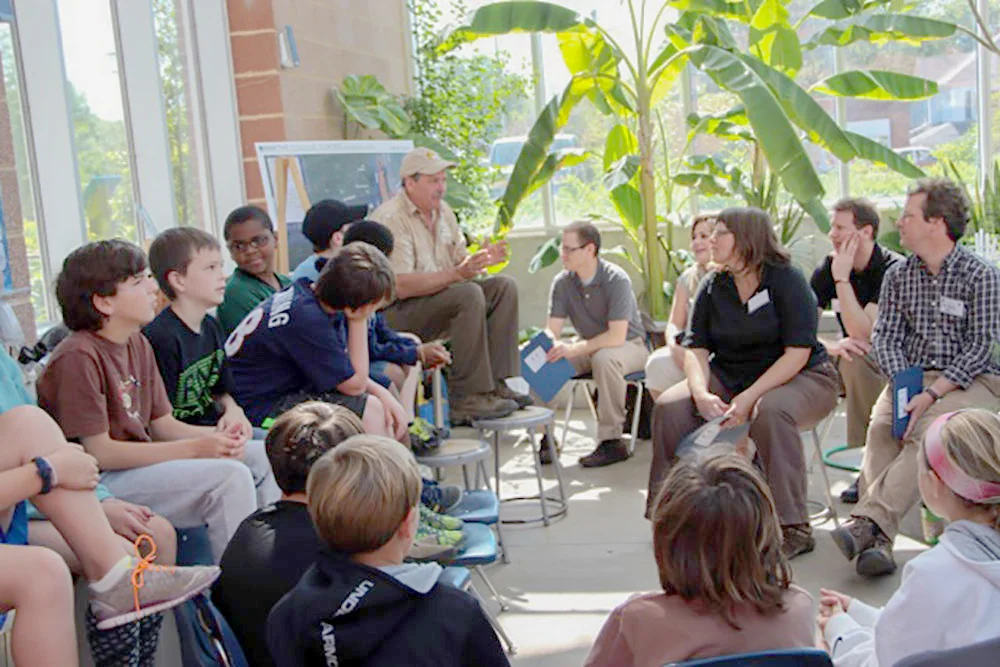“School is the most influential institution in modern society.
There are many ways to design an organization that promotes learning and the present industrial model of schooling is not one of them. There are some exciting counter examples, but they haven’t spread. The community, cultural institutions and business have to be involved. We need a broader base of change. In the eyes of a child, the future is alive. Maybe children need to step forward as leaders.”
NEW VISIONS OF SCHOOL
Project Based Learning and Sustainability Education
The “industrial model of schooling” that Peter Senge refers to is built on frames of constriction, control, and a limited body of knowledge. The new, innovative models of school emerging today are learning communities evolving in environments of openness, flexibility, limitless knowledge, inquiry and invention. Educators in these new models of school understand multiple intelligences, learning style differences, computer technology, and child and adolescent psychology. The models evolve in accordance with systems thinking and organizational learning. Overarching the innovations in education is the compelling issue of sustainability: the sustainability of our interconnected economic, environmental and social systems. We must prepare our young people to create a remarkably different way of living, “one that can restore ecosystems and protect the environment while bringing forth innovation, prosperity, meaningful work, and true security (Hawken, 1993).”
Cadwell Collaborative is uniquely positioned to work with schools and communities that want to envision a hopeful, healthy future, and realize that vision through innovations in school curricula, organizational systems, architectural design and networks with communities.
Core Competencies of Sustainability Education
Sustainability Education includes the acquisition of particular knowledge and skills, and the values needed to put this knowledge into practice. They include:
- Ecological knowledge
- The ability to think systemically
- The ability the think critically and to solve problems creatively
- The ability to assess the impact of human actions and decisions
- The ability to envision long term consequences
- A deeply felt concern for the well-being of the Earth and all living things
- A sense of wonder and a deep appreciation of place
- Empathy and the ability to see and appreciate multiple perspectives
- A commitment to equity, justice, inclusivity, and respect for all people
- Skills in building, governing, and sustaining communities
- The ability to assess and adjust the uses of energy and resources
- The capacity to convert convictions into practical, effective action
(From The Center for Ecoliteracy’s Competencies for Sustainability Education)
Examples of Sustainability Education in Practice:
The Sustainable Schools Project, sponsored by Shelburne Farms in Vermont, is a dynamic new model for school improvement and civic engagement. The program helps schools use sustainability as an integrating context for curriculum, community partnerships, and campus practices.
In 2006 the state of Washington Education Department issued a requirement that all public schools include Sustainability Education in their curricula.
Exemplary Schools:
The photographs on this website come from many of our partner and client schools as well as exemplary schools that we visit:
The College School
The St. Michael School of Clayton
Opal School of the Portland Children’s Museum
La Scuola
Buffalo School 33 Bilingual Center
Indianapolis Public Butler University Laboratory School
Lesley University
Butler University
Emilia Preschool, Vastaras, Sweden
Sankt Hansgården, Lund, Sweden
Buckingham Browne & Nichols School
Please visit their websites to learn more about their work.
We are fortunate to work closely with schools that are public, charter or independent. We are gratified also to partner with both Butler and Lesley University to offer classes and seminars. The work of these schools and universities and all the schools where we work is ever-evolving. The educators in these schools are pioneering the effort to unite exceptional, creative, multidisciplinary student work with the twenty-first century skills of collaboration, innovation, and authentic engagement with communities. Our collaborative work is featured on our blog posts where you can read about and view images of all our partner and client schools.




